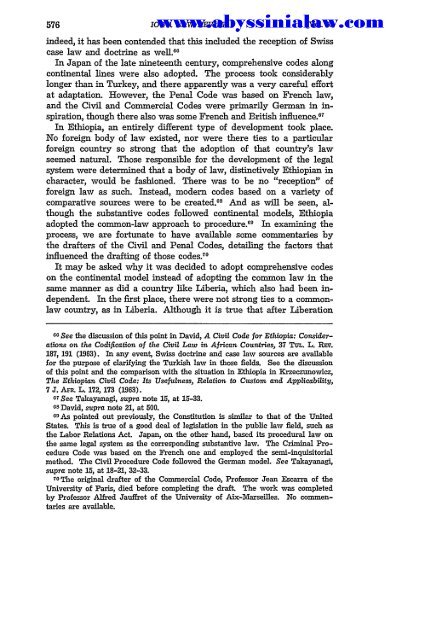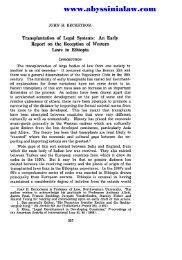Create successful ePaper yourself
Turn your PDF publications into a flip-book with our unique Google optimized e-Paper software.
IOWA www.abyssinialaw.com<br />
LAW REVIEW<br />
[Vol. 53<br />
indeed, it has been contended that this included the reception of Swiss<br />
case law and doctrine as well. 60<br />
In Japan of the late nineteenth century, comprehensive codes along<br />
continental lines were also adopted. The process took considerably<br />
longer than in Turkey, and there apparently was a very careful effort<br />
at adaptation. However, the Penal Code was based on French law,<br />
and the Civil and Commercial Codes were primarily German in inspiration,<br />
though there also was some French and British influence. 67<br />
In Ethiopia, an entirely different type of development took place.<br />
No foreign body of law existed, nor were there ties to a particular<br />
foreign country so strong that the adoption of that country's law<br />
seemed natural. Those responsible for the development of the legal<br />
system were determined that a body of law, distinctively Ethiopian in<br />
character, would be fashioned. There was to be no "reception" of<br />
foreign law as such. Instead, modern codes based on a variety of<br />
comparative sources were to be created. 6 And as will be seen, although<br />
the substantive codes followed continental models, Ethiopia<br />
adopted the common-law approach to procedure. 69 In examining the<br />
process, we are fortunate to have available some commentaries by<br />
the drafters of the Civil and Penal Codes, detailing the factors that<br />
influenced the drafting of those codes. 70<br />
It may be asked why it was decided to adopt comprehensive codes<br />
on the continental model instead of adopting the common law in the<br />
same manner as did a country like Liberia, which also had been independent.<br />
In the first place, there were not strong ties to a commonlaw<br />
country, as in Liberia. Although it is true that after Liberation<br />
66 See the discussion of this point in David, A Civil Code for Ethiopia: Considerations<br />
on the Codification of the Civil <strong>Law</strong> in African Countries, 37 Tur.. L. REv.<br />
187, 191 (1963). In any event, Swiss doctrine and case law sources are available<br />
for the purpose of clarifying the Turkish law in those fields. See the discussion<br />
of this point and the comparison with the situation in Ethiopia in Krzeczunowicz,<br />
The Ethiopian Civil Code: Its Usefulness, Relation to Custom and Applicability,<br />
7 J. Am. L. 172, 173 (1963).<br />
67 See Takayanagi, supra note 15, at 15-33.<br />
68 David, supra note 21, at 500.<br />
3 9 As pointed out previously, the Constitution is similar to that of the United<br />
States. This is true of a good deal of legislation in the public law field, such as<br />
the Labor Relations Act. Japan, on the other hand, based its procedural law on<br />
the same legal system as the corresponding substantive law. The Criminal Procedure<br />
Code was based on the French one and employed the semi-inquisitorial<br />
method. The Civil Procedure Code followed the German model. See Takayanagi,<br />
supra note 15, at 18-21, 32-33.<br />
70The original drafter of the Commercial Code, Professor Jean Escarra of the<br />
University of Paris, died before completing the draft. The work was completed<br />
by Professor Alfred Jauffret of the University of Aix-Idarseilles. No commentaries<br />
are available.





